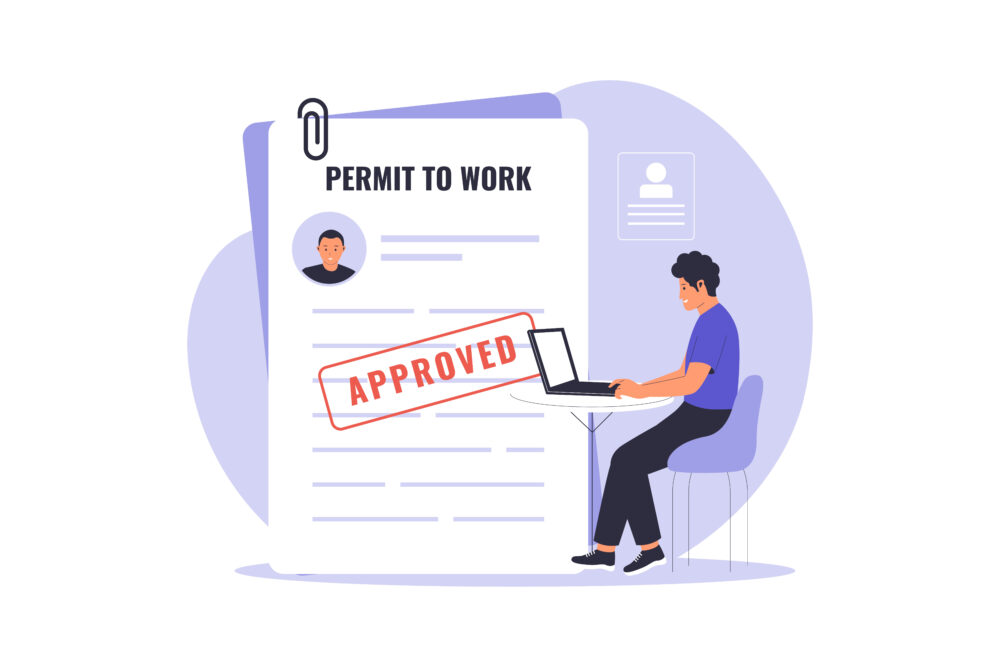A work permit is one of the essential conditions for foreign workers to work in Vietnam. However, in reality, many foreign workers sign and perform labor contracts with employers even without a work permit. When a dispute occurs, especially in cases where the employer unilaterally terminates the labor contract, the signed labor contract is inherently invalid. Therefore, the employee cannot effectively protect their rights.
1. Foreign workers working in Vietnam are required to have a work permit
According to Labor Code2019, foreign workers working in Vietnam must meet the conditions of having a work permit issued by a competent Vietnamese State authority, except in cases not subject to a work permit as prescribed in Article 154 of Labor Code 2019.1 Based on the issued work permit, foreign workers will be eligible to sign a labor contract with a term consistent with the term in the work permit as prescribed in Clause 2, Article 151 of Labor Code 2019. Therefore, it can be seen that except for foreign workers who are not subject to work permits, foreign employees are required to have a work permit when working in Vietnam.
After being granted a work permit, foreign workers are obliged to present the work permit when requested by competent State authorities. In case of working without a work permit, foreign workers will be forced to leave or deported according to the provisions of the law on entry, exit, transit, and residence of foreigners in Vietnam.2
2. Labor contracts of foreign workers working in Vietnam without a work permit are invalid
Although Article 49 of Labor Code 2019 does not directly stipulate that labor contracts are invalid in cases where foreign workers work in Vietnam without a work permit, the labor contract in this case can be determined to be completely invalid according to Point a, Clause 1, Article 49 of Labor Code 2019. Specifically, Point a, Clause 1, Article 49 of Labor Code 2019 stipulates that the labor contract is completely invalid if the entire content of the labor contract violates the law.
Explaining the complete invalidity of the labor contract in this case, it can be seen that, based on Article 151 of Labor Code 2019 mentioned above, labor law requires foreign workers to have a work permit to work in Vietnam. Therefore, if a foreign worker working in Vietnam signs a labor contract without a work permit, this contract violates the law. Consequently, this labor contract may be deemed invalid according to Point a, Clause 1, Article 49 of Labor Code 2019.
In fact, Vietnamese courts have issued decisions declaring labor contracts invalid in such cases. According to Cassation Decision No. 12/2006/LD-GDT dated July 4, 2006, of the Supreme People’s Court, Judgment No. 06/2023/LD-PT dated June 7, 2023, of the High-Level People’s Court in Ho Chi Minh City, and Judgment No. 20/2019/LD-ST dated October 22, 2019, of the People’s Court of Go Vap District, Ho Chi Minh City, labor contracts signed by foreign workers to work in Vietnam without a work permit are determined to be invalid.
In dispute resolution, many foreign workers argue that it is the employer’s responsibility to ensure they have a work permit, as the employer is obliged to carry out the necessary procedures. However, despite these procedural obligations, the employer will initiate the process to request a work permit from the State labor management agency for foreign workers.3 Nevertheless, foreign workers are still required to cooperate with their employers in providing necessary documentation for work permit applications. Therefore, the argument that the employer’s failure to obtain a work permit is solely responsible for the employee’s violation is not entirely reasonable. Clause 3, Article 151 of Labor Code 2019 clearly stipulates that foreign workers in Vietnam must comply with Vietnamese labor laws, rendering this argument invalid in court.4 In cases where employers hire foreign workers without a work permit, they will be subject to administrative penalties according to the law.
3. Legal consequences of invalid labor contracts due to foreign workers working in Vietnam without a work permit
Article 11 of Decree 2020/ND-CP provides guidance on handling labor contracts that are completely invalid because the entire content of the labor contract violates the law. Accordingly, when the labor contract is declared completely invalid, the employee and the employer enter into a new labor contract in accordance with the provisions of the law. If the two parties do not sign a new labor contract, the existing labor contract will be terminated. In such cases, the rights, obligations, and interests of the employee from the time they start working under the labor contract declared invalid until its termination are determined as follows:
a) If the rights and interests of each party in the labor contract are not lower than the provisions of the law and the applicable collective labor agreement, the rights, obligations, and interests of the employee will be implemented according to the provisions of the law and the applicable collective labor agreement despite the labor contract being declared invalid;
b) If the labor contract contains content about the rights, obligations, and interests of each party that violates the law but does not affect other content of the labor contract, then the rights, obligations, and interests of the employee will be handled according to regulations on handling partially invalid labor contracts.
It can be seen that, according to the provisions outlined in Decree 2020/ND-CP, the rights of foreign workers in Vietnam are still safeguarded in the event of an invalid labor contract due to the absence of a work permit. These rights are resolved based on the terms of the contract that has been declared invalid until its termination. Consequently, employees will continue to receive entitlements such as wages for the duration they worked for the employer. As a labor contract inherently represents a legal transaction involving the exchange, purchase, and sale of labor5, the resolution of legal consequences in cases of contract invalidity is feasible. The distinction lies in comparison to resolving legal consequences in invalid civil transactions, where parties aim to restore the original state and return what they have received.6 This regulation is formulated to uphold the rights of workers when labor cannot be returned or restored to its original condition.
Furthermore, the employer is obligated to compensate the employee with an amount mutually agreed upon by both parties, but not less than one month’s regional minimum wage for each year of service, as determined by the Government at the time of declaring the labor contract invalid. The employee’s tenure for calculating benefits is based on the actual duration of employment under the declared invalid labor contract. Additionally, severance pay for labor contracts terminated before their invalidity declaration is resolved to ensure the rights of employees.
In summary, obtaining a work permit is a crucial aspect that foreign workers must consider when working in Vietnam to ensure that their labor contracts comply with the law, thereby safeguarding their rights and legal entitlements.
(1) Point d, Clause 2, Article 151 of Labor Code 2019.
(2) Clauses 2 and 3, Article 153 of Labor Code 2019.
(3) Section 3 Chapter II Decree 152/2020/ND-CP.
(4) Judgment No. 102/2019/LD-ST dated January 29, 2019 of the People’s Court of Ho Chi Minh City.
(5) Nguyen Huu Tri, Characteristics of labor contracts, Legislative Studies Journal, No. 10, October 2002.
(6) Clause 2, Article 131 of Civil Code 2015.
Disclaimers:
This article is for general information purposes only and is not intended to provide any legal advice for any particular case. The legal provisions referenced in the content are in effect at the time of publication but may have expired at the time you read the content. We therefore advise that you always consult a professional consultant before applying any content.
For issues related to the content or intellectual property rights of the article, please email cs@apolatlegal.vn.
Apolat Legal is a law firm in Vietnam with experience and capacity to provide consulting services related to Employment and contact our team of lawyers in Vietnam via email info@apolatlegal.com.





































